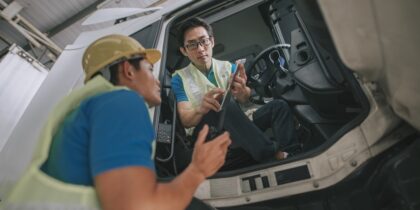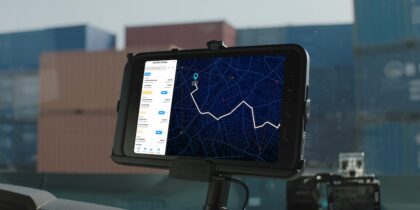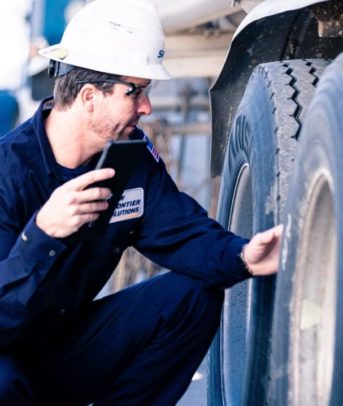In the world of trucking, staying connected is vital in order to track deliveries, update schedules and stay in touch with drivers. The future of trucking will rely heavily on technology of all kinds, from driverless trucks to remote sensors for monitoring tire pressure and engine conditions. The smartphone will be central to all of this, and it is already one of a driver’s most vital tools for staying connected.
According to a recent Samsung enterprise mobility trends study conducted by GfK Public Communications and Social, one-third of all drivers already believe their smartphones have replaced the need for a traditional PC, with 61 percent choosing a smartphone if forced to pick just one device. Two-thirds said that they’d be able to do their work today using only a smartphone — this is a higher portion than any of the other sectors surveyed.
Looking specifically at the world of trucking, the results show just how key smartphones are, not only for the drivers but also for mobile fleet management, and it’s clear to see how the future of trucking will rely on these devices to help improve efficiency and drive innovation.
How Drivers Use Their Smartphones
Eighty-seven percent of drivers say they used their smartphones every single day for work and, on average, they spend 37 percent of their workday using a smartphone. Here are drivers’ top three uses for smartphones:
- Making calls — 70 percent
- Navigation — 55 percent
- Texting or chatting — 51 percent
Half of drivers surveyed say they always communicate with dispatch using their smartphones, indicating just how important a tool smartphones are for mobile fleet management.
Despite this, the GfK survey data suggests that there are many areas where smartphones can still make a big difference. For example, just 19 percent of drivers always record delivery status using their smartphones and only 26 percent log their driving hours using a smartphone. This gives fleet managers more opportunities for smartphone applications, as drivers are already using mobile devices for a majority of interactions.
The Future of Fleet Management
Get the facts on the ELD mandate and what it means for trucking fleets. Download Now
Drivers still rely on other devices or paper-based record-keeping to do the job, but if companies want their drivers to work more efficiently and more safely, they need to ensure their mobile fleet management systems are tuned to leverage the power of modern smartphones, and give drivers the best tools available.
Enhancing Fleet Management With Smartphones
As well as improving the lives of drivers, smartphones can help those managing a fleet of trucks. Today there are a wealth of apps and management systems available which allow managers to easily track and update what their trucks are doing, all from their smartphones.
For businesses, especially smaller transportation and logistics firms, this flexibility brings big benefits, including the ability to quickly and easily access the information you need no matter where you are. Since managers are no longer tied to a desktop machine, they can deal with emergencies more quickly and give customers instant updates about the location of trucks and estimated delivery times.
Additionally, with drivers having increased connectivity, they can provide fleet managers real-time data and status updates through electronic logging efforts, offering greater visibility.
Still Experiencing Screen Issues
While we can see that truck drivers use their smartphones a lot, the survey also reveals that the biggest sticking point for them is the size of the smartphone screen. Fifty-eight percent of drivers cite “working on a small screen” as a major or minor frustration. Most believe that a screen size of 5.5-inches is ideal for working on the go, making smartphones like the Galaxy S8 (5.8-inch screen) and Galaxy S8+ (6.2-inch screen) ideal for working while on the move.
Predicting the Future of Trucking
While smartphones today are incredibly sophisticated pieces of technology, there are still areas where drivers and trucking companies believe that new innovations will bring even more benefits, and even help address the cited pain points.
First among these advances is in voice assistant technology, powered by artificial intelligence. Drivers see this technology bringing “major” benefits to their lives, such as hands-free operations for making a call or setting a new destination. Today more than two out of three drivers say they would be likely to use a voice assistant if it was integrated into a business app they were using, meaning there is a large potential for voice assistant technology to help improve efficiency and driver safety.
The other area that will soon bring big benefits is biometric security. With fingerprint and iris recognition technology already baked into Samsung’s latest smartphones, companies can make use of this to help improve security. By ensuring drivers log into their work apps using biometric sensors, trucking companies can ensure a greater degree of security, helping give their clients more peace of mind.
For both truckers and the companies that manage them, smartphones are becoming an indispensable tool both on the road and in the office. Offering both ease of use and improved efficiency, deploying mobile technology smartly can benefit a trucking business of any size.
Discover more technology advancements in the transportation field that are set to dramatically impact this rapidly changing industry.









